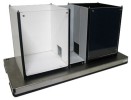Authors
H. Houchi, D. Babovic, O. Pierrefiche, C. Ledent, M. Daoust et al.
Lab
Université de Picardie Jules Verne, Groupe de Recherche sur l’Alcool et les Pharmacodépendances (GRAP), Amiens, France.
Journal
Neuropsychopharmacology
Abstract
Cannabinoids and ethanol activate the same reward pathways, and recent advances in the understanding of the neurobiological basis of alcoholism suggest that the CB1 receptor system may play a key role in the reinforcing effects of ethanol and in modulating ethanol intake. In the present study, male CB1 receptors knockout mice generated on a CD1 background displayed decreased ethanol-induced conditioned place preference (CPP) compared to wild-type (CB1_/_) mice. Ethanol (0.5, 1.0, 1.5, and 2.0 g/kg) induced significant CPP in CB1_/_ mice at all doses tested, whereas it induced significant CPP only at the highest dose of ethanol (2.0 g/kg) in CB1 / mice. However, there was no genotypic difference in cocaine (20 mg/kg)-induced CPP. There was also no genotypic difference, neither in cocaine (10–50 mg/kg) nor in D-amphetamine (1.2–5 mg/kg)-induced locomotor effects. In addition, mutant and wild-type mice did not differ in sensitivity to the anxiolytic effects of ethanol (1.5 g/kg) when tested using the elevated plus maze. Interestingly, this decrease in ethanol efficacy to induce CPP in CB1 / mice was correlated with an increase in D2/D3 receptors, as determined by [3H]raclopride binding, whereas there was no difference in D1-like receptors, as determined by [3H]SCH23390 binding, measured in the striatum from drug-na?¨ve mice. This increase in D2/D3 binding sites observed in CB1 knockout mice was associated with an altered locomotor response to the D2/D3 agonist quinpirole (low doses 0.02–0.1 mg/kg) but not to an alteration of quinpirole (0.1–1.0 mg/kg)-induced CPP compared to wild-type mice. Altogether, the present results indicate that lifelong deletion of CB1 receptors reduced ethanol-induced CPP and that these reduced rewarding effects of ethanol are correlated to an overexpression of striatal dopamine D2 receptors.
BIOSEB Instruments Used:
Place Preference Cage (BX-CPP),Spatial place preference Test (BX-SPP)

 Douleur - Allodynie/Hyperalgésie Thermique
Douleur - Allodynie/Hyperalgésie Thermique Douleur - Spontanée - Déficit de Posture
Douleur - Spontanée - Déficit de Posture Douleur - Allodynie/Hyperalgésie Mécanique
Douleur - Allodynie/Hyperalgésie Mécanique Apprentissage/Mémoire - Attention - Addiction
Apprentissage/Mémoire - Attention - Addiction Physiologie & Recherche Respiratoire
Physiologie & Recherche Respiratoire
 Douleur
Douleur Système Nerveux Central (SNC)
Système Nerveux Central (SNC)  Neurodégénérescence
Neurodégénérescence Système sensoriel
Système sensoriel Système moteur
Système moteur Troubles de l'humeur
Troubles de l'humeur Autres pathologies
Autres pathologies Système musculaire
Système musculaire Articulations
Articulations Métabolisme
Métabolisme Thématiques transversales
Thématiques transversales Bonne année 2025
Bonne année 2025 
